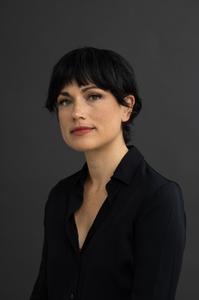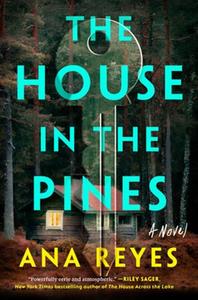
|
|
| photo: Christopher Brown | |
Ana Reyes is the author of The House in the Pines (Dutton, January 3, 2023), a thriller that puts memory and manipulation in the spotlight with haunting results. Before getting her MFA in fiction at Louisiana State University, Reyes worked as a script reader in Hollywood. She lives in Los Angeles with her husband and teaches creative writing to older adults at Santa Monica College.
Handsell readers your book in 25 words or less:
To solve the mystery of her best friend's death, a young woman must return to a place she can't remember--the house in the pines.
On your nightstand now:
I'm reading The Furrows by Namwali Serpell. It hooked me with its first, heartbreaking, exquitely written scene and hasn't let up since. I'm almost done with it now, deep into its mystery, and can't wait to find out how it ends. I like to read just one book at a time, but I'm looking forward to starting The Cloisters by Katy Hays next.
Favorite book when you were a child:
The Magic School Bus at the Waterworks by Joanna Cole. I love the moment when the kids shrink down to the size of water drops and fall from the clouds like rain and then flow through a reservoir eventually to pour out through a faucet at their school. To this day, I'd follow Ms. Frizzle anywhere.
Your top five authors:
Angela Carter, Elif Shafak, Italo Calvino, Haruki Murakami, Christopher Pike.
Book you've faked reading:
I was assigned Fear and Trembling by Søren Kierkegaard in grad school and made it only through the first 20 pages or so. Having never studied philosophy, I found myself stymied by many of the concepts and all of the Descartes references. I'd like to return to it someday when I have more time and space, as I remember sensing Kierkegaard was getting at something important.
Book you're an evangelist for:
The Keep by Jennifer Egan. I can't count how many people I've recommended it to, and everyone who reads it seems to love it as much as I do. Its sense of mystery is so thick you could cut it with a knife.
 Book you've bought for the cover:
Book you've bought for the cover:
What We Fed to the Manticore by Talia Lakshmi Kolluri has one of the most beautiful covers of 2022. It features a vivid blue tiger against eye-popping swirls of color and a scattering of roses. I didn't buy this book only for the cover--I was also intrigued by the idea of stories narrated by animals--but the cover was certainly the first thing that jumped out at me.
Book you hid from your parents:
My entire Christopher Pike collection. I was 10 or 11 when I started reading him--the first one I read was Bury Me Deep--and I knew at once from all the sex and occasional drug use that my mom would not approve.
Book that changed your life:
I worked at a talent agency for much of my 20s, reading screenplays and writing reports on them for my bosses. I learned a lot about writing and storytelling from that job, but one downside was that I rarely read for fun.
Then one day a man approached me in the elevator at work and offered me The Bloody Chamber by Angela Carter. The man (who I'd later learn was a writer) worked in the mailroom and had noticed a collection of fairy tales on my desk while delivering my mail. Something about the cover (and the man) intrigued me enough to read it ahead of the leaning tower of scripts in my inbox, and what I read launched the next phase of my life. Today I'm married to the man in the elevator and count The Bloody Chamber as one of my greatest inspirations.
Favorite line from a book:
This is a tough one! I have many, but one that stands out is from A Short History of Myth by Karen Armstrong, a book I've read, reread and even assigned to a group of college freshman I once taught in a class on comparative mythology.
Armstrong discusses how the stories we tell are part of what makes us human. She points out how dogs, for example, don't seem to agonize over the "canine condition." "But human beings," she writes, "fall easily into despair, and from the very beginning we invented stories that enabled us to place our lives in a larger setting, that revealed an underlying pattern, and gave us a sense that, against all the depressing and chaotic evidence to the contrary, life had meaning and value."
This line helps me understand the importance of stories in my own life. For as long as I remember, they've helped me make sense of the world.
Five books you'll never part with:
The Bloody Chamber by Angela Carter; Like Water for Chocolate by Laura Esquivel; The Haunting of Hill House by Shirley Jackson; Piranesi by Susanna Clarke; The Snow Child by Eowyn Ivey.
Book you most want to read again for the first time:
Kafka on the Shore was the first book I read by Haruki Murakami, and I knew almost nothing about it going in. I wish I could go back and immerse myself in its mind-bending strangeness for the first time.

